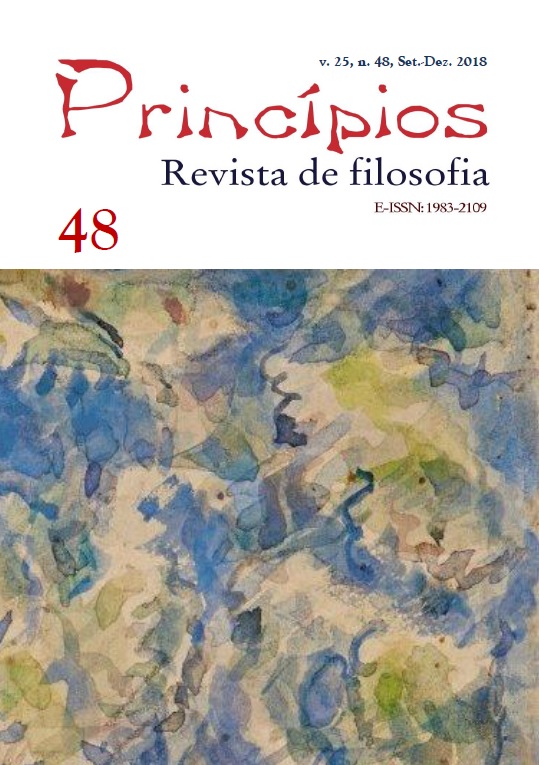"Thinking about what we are doing"
the reach of The Human Condition in contemporary philosophical-political thought
DOI:
https://doi.org/10.21680/1983-2109.2018v25n48ID14129Keywords:
Vita activa, Legacy, Human conditionAbstract
Explaining and articulating the three activities that condition human life, namely, labor, work and action, appear as the motto of the Arendt’s work The Human Condition. However, our attention turns to one of the last sentences that compose the prologue, which present the proposal that will guide the reflections of this work, that is configured in “just think what we are doing”. This proposal seems to be something simple, somewhat unrelated to great philosophical works. However, “thinking about what we are doing” presents itself as something deep and profitable, because it is a matter of thinking about what modern man is doing within his active life. Given this argumentative framework, it may be asked: what is the impact of Arendtian thought, contained in the pages of The Human Condition, sixty years after its publication? Are we facing a great work on political and philosophical thought, or, more than this, are we before a classic? To answer these questions, three will be the qualities we will use to think about this work: if it is capable of being an authentic interpreter of its time; if readings and re-readings are instigated; and if it was able to elaborate concepts and categories that lead us to understand reality.
Downloads
References
ADLER, Laure. Nos passos de Hannah Arendt. Rio de Janeiro: Record, 2007.
AGAMBEN, Giorgio. Homo sacer: o poder soberano e a vida nua I. Trad. Henrique Burigo. 2. ed. Belo Horizonte: UFMG, 2007.
AGAMBEN, Giorgio. O uso dos corpos. Trad. Selvino J. Assmann. São Paulo: Boitempo, 2017.
ARENDT, Hannah. A vida do espírito. 5. ed. Trad. Antônio Abanches. Rio de Janeiro: Relume-Dumará, 2002.
ARENDT, Hannah. A condição humana. Trad. Roberto Raposo. 10. ed. Pref. Celso Lafer. Rio de Janeiro: Forense Universitária, 2005.
ARENDT, Hannah. A condição humana. Trad. Roberto Raposo. 11. ed. Revisão e Apresentação de Adriano Correia. Rio de Janeiro: Forense Universitária, 2010.
BOBBIO, Norberto. Teoria geral da política: a filosofia política e a lição dos clássicos. Org. Michelangelo Bovero. Trad. Daniela Beccaccia Versiani. 20. ed. Rio de Janeiro: Elsevier, 2000.
CANOVAN, Margaret. Introduction. In: ARENDT, Hannah. The Human Condition. 2. ed. Chicago: University of Chicago, 1998.
CORREIA, Adriano. Apresentação à nova edição brasileira de A condição humana. In: ARENDT, H. A condição humana. Trad. Roberto Raposo. 11. ed. Revisão e Apresentação de Adriano Correia. Rio de Janeiro: Forense Universitária, 2010. p. XIII-XLIV.
HAN, Byung-Chul. Sociedade do cansaço. Trad. Enio Paulo Giachini. 2. ed. Petrópolis: Vozes, 2017.
LAFER, Celso. Na confluência entre o pensar e o agir: sobre uma experiência com os conceitos de Hannah Arendt. In: DUARTE, André; LOPREATO, Christina; MAGALHÃES, Marionilde Dias Brepohl de. (Org.). A banalização da violência: a atualidade do pensamento de Hannah Arendt. Rio de Janeiro: Relume-Dumará, 2004. p. 335-351.
PASSOS, Fabio Abreu dos. A faculdade do pensamento em Hannah Arendt: implicações políticas. Rio de Janeiro: Lumen Juris, 2017.
Downloads
Published
How to Cite
Issue
Section
License
Authors retain copyright and grant the journal right of first publication with the work simultaneously licensed under a Creative Commons Attribution License that allows others to share the work with an acknowledgement of the work's authorship and initial publication in this journal.


 Português (Brasil)
Português (Brasil) English
English Español (España)
Español (España) Français (Canada)
Français (Canada)


